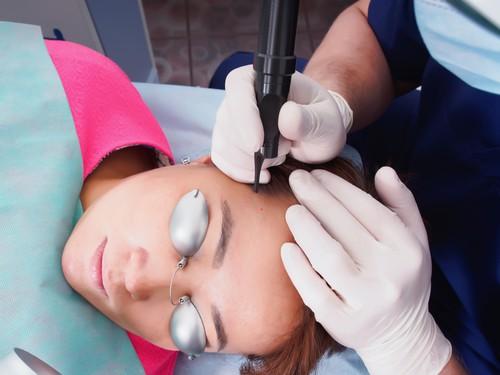Laser treatments for dermatological problems have become increasingly popular over the past few years. The increasing availability of machines and development of technology, coupled with increasing awareness of laser treatments has contributed to the growth of this segment of the aesthetic market.
Laser Treatments Are Here To Stay
Laser treatments now have become the mainstay of treatment of a variety of skin problems such as pigmentation, acne scars and tattoo removal. With so many different types and models of skin lasers in the market, it is often confusing what treatment is suitable for your particular skin type and concern.
Four Common Types Of Laser You Might Encounter At Aesthetic/Dermatologist Clinics:
1. Pigment Lasers
These are usually non-ablative lasers, which emit light energy that is selectively absorbed by pigments, resulting in break up of pigments. Depending on the type of pigment and the depth of pigment, different wavelengths of laser may be used. Pigment lasers are also used for tattoo removal. Examples of pigment lasers are Tribeam, ProYellow, Revlite, Spectra. Just like a car, every brand of machine has its own strengths and weaknesses, but all perform a similar function.
2. Rejuvenation Lasers
Rejuvenation lasers are usually longer pulse lasers compared to pigment lasers. These work by producing heating in the dermis of the skin, stimulating collagen production. Some brands you may encounter are Fotona, Cooltouch and Cutera
3. Fractional Lasers
Fractional lasers are designed to resurface the skin. The treatment often produces some downtime in the form of redness and mild peeling and scabbing, but the downtime is less than with traditional ablative lasers. Some examples of fractional lasers include Fotona, Fraxel and Dermablate.
4. Ablative Lasers
These lasers have the ability to cut into tissue. Ablative lasers are more commonly used by surgeons in an operating theater setting, but aesthetic physicians and dermatologists sometimes use them for procedures such as mole removal and milia seeds. Ablative lasers for skin resurfacing causes significant downtime and therefore is getting less popular.
Common questions and misconceptions about laser treatment:
1) My beautician can do laser treatment for me
In Singapore, laser treatments have to be done by certified doctors. These doctors need to have attended courses to certify them competent and knowledgeable in lasers, as well as have NEA approval and licenses to operate medical grade lasers. The lasers and lights at beauticians are usually not medical grade lasers, and are more similar to laser pointers.
2) The stronger the laser the better. The redder my face, the better
Not necessarily. Lasers work by selectively targeting certain substances in the skin, producing heat energy in the process. If too much heating is achieved during the treatment, the skin becomes too stimulated and inflamed. This can lead to deposition of pigments by the pigment cells in the skin, resulting in Post Inflammatory Hyperpigmentation. Also, if a pigment laser is overdone on Asian skin, the chances of developing hypopigmentation or white spots on the skin increases exponentially.
3) My friend had a laser done for her and one treatment was enough for her to see results, why is mine different?
There are many different types of pigments that respond differently to laser treatments. Some pigments that are more superficial, like freckles and solar lentigines, can be treated with a laser that produces scabbing and peeling off of the pigments. This is not the case for deeper pigments like melasma and hori’s nevus. Thus your doctor will assess your skin and recommend you the most appropriate laser treatment.
4) Do I need to apply sunblock and avoid the sun while I am doing laser treatment?
Sunblock should be applied even if you are not doing laser treatment. As for sun exposure, the key is moderation. The human body requires some sun exposure to produce Vitamin D, so please do not stay in a dark room after a laser. However, it is important that we do not get exposed to the sun to the point of getting red, as this increases the risk of Post Inflammatory Hyperpigmentation after a laser treatment.
5) Lasers will thin my skin
This is untrue. Most lasers nowadays are non ablative lasers used for pigments and rejuvenation. These lasers do not have cutting properties and do not burn off any skin layers. For the fractional resurfacing lasers, theses actually stimulate collagen and new skin growth, so in fact, your skin will feel firmer after doing the treatments.
With modern laser technology, most patients can benefit from laser treatments. It is important to choose an experienced and skilled laser doctor who can tailor your treatments according to your skin condition as well as your expectations.
Check out other beauty related posts here on LadiesClub.sg.

